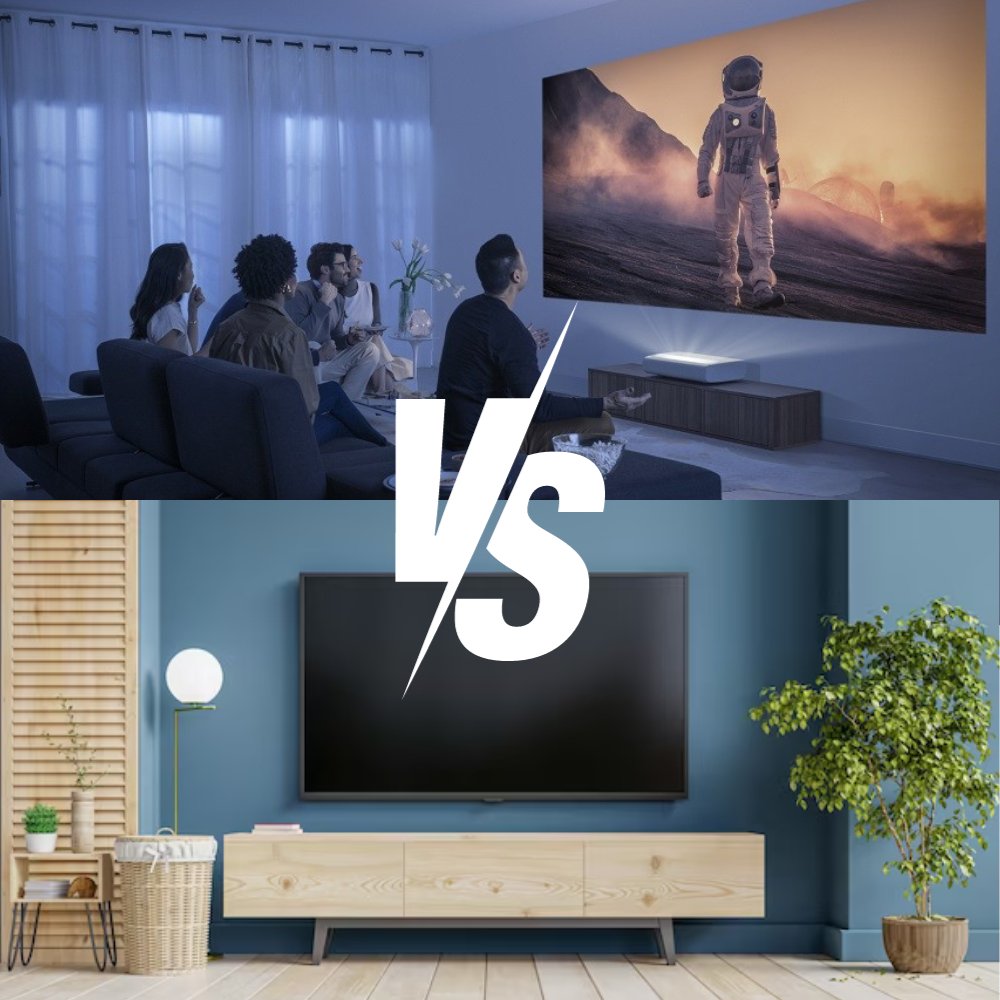
In an era where the convenience of home streaming has somewhat dimmed the charm of cinema, a new player has entered the field, promising to bring back the magic of big screens without needing a big room: the mini projector.
In an era where the convenience of home streaming has somewhat dimmed the charm of cinema, a new player has entered the field, promising to bring back the magic of big screens without needing a big room: the mini projector.
But as with any technological investment, the burning question remains: Are they worth your hard-earned money?
The Dawn of the Mini Projector Revolution
The mini projector revolution began as a response to a growing demand for portable, versatile, and user-friendly devices capable of delivering high-quality visual experiences.
In an age where content consumption has skyrocketed, these compact devices have made it possible to transform any space into a personal cinema, meeting room, or gaming den.

Why They've Captured Our Imagination
Portability: One of the most compelling attributes of mini projectors is their portability. Small enough to fit in the palm of your hand, they can be taken anywhere, making them perfect for on-the-go presentations, outdoor movie nights, or impromptu gatherings.
Versatility: Mini projectors can connect to a myriad of devices, including smartphones, laptops, tablets, and more, offering a seamless viewing experience for virtually any type of media.
Ease of Use: With user-friendly interfaces and straightforward setup processes, mini projectors are accessible to everyone, not just the tech-savvy.
The Technological Innovations Driving the Revolution
Advancements in LED and laser light sources have dramatically improved the brightness and longevity of mini projectors, while developments in digital imaging have enhanced picture quality. Battery technology has also made leaps, allowing these devices to run longer on a single charge.
Are Mini Projectors Worth Your Investment?
Pros:
- Flexibility: Their ability to be used in a variety of settings, from dark rooms to dimly lit outdoor spaces, adds a level of flexibility unmatched by traditional television or larger projectors.
- Convenience: Easy to pack and set up, they are ideal for professionals and entertainment enthusiasts alike.
Cons:
- Brightness and Quality Limitations: While technology has advanced, mini projectors may still struggle in brightly lit environments or fail to match the image quality of larger, more expensive projectors.
- Sound Quality: Smaller projectors typically have less powerful speakers, which can affect the overall viewing experience.
Image Quality and Brightness: One common critique of mini projectors is their battle with image quality and brightness, especially in well-lit environments. While top-tier models boast impressive specs, the entry-level options might leave cinephiles wanting more.
Sound Quality: Compact size often means compact sound. While some models come equipped with built-in speakers that do a decent job, audiophiles will likely find themselves yearning for a sound system hookup.
Battery Life: The convenience of cordless operation comes at the cost of battery life. For longer viewing sessions, you might find yourself tethered to a power source, which can dampen the freedom a bit.
Types of Mini Projectors and Their Best Use Cases
- For Movies: The Epson EpiqVision Mini EF12 stands out for its superior contrast, brightness, and advanced imaging technology, delivering a cinematic experience with native 1080p resolution.
It's a bit on the heavier side for a mini projector and comes with a higher price tag, but its built-in Android TV and excellent speakers make it worth the investment for movie enthusiasts.
2. For Gaming: The XGIMI Elfin Mini Projector is tailored for gamers with its crisp picture, low latency, superior audio quality, and 3D mode. Despite its challenges with iOS compatibility and some users experiencing WiFi connection issues, its 1920 x 1080 resolution and built-in Android TV offer a versatile entertainment experience.
3.Pocket-Sized: The Kodak Luma 450 is notable for its compact size, delivering full 1080p resolution and compatibility with 4K signals. It's not the brightest, with only 200 ANSI lumens, and the audio might feel a bit tinny, but its 3-hour battery life and portability make it ideal for travel.
4.For Travel: The Anker Nebula Solar, with its balance of performance and portability, might be another excellent option for those on the move, although specific details weren't discussed in the sources provided.
Key Features to Look For
When shopping for a mini projector, consider several critical features to ensure you get a device that suits your needs:
- Connectivity: Look for multiple connectivity options, including HDMI and USB, to easily connect to various devices.
- Battery Power: A long-lasting battery is crucial for portability, with the best batteries offering around 6 hours of use.
- Built-In Speakers: While most mini projectors have built-in speakers, it's often recommended to have a Bluetooth speaker handy for better audio quality.
-
Portability: Despite being larger than pico projectors, mini projectors strike a balance between brightness and portability, making them suitable for outdoor movie viewing.

Applications and Considerations
Mini projectors are versatile and can be used for a wide range of applications:
- Classroom and Business Meetings: They are convenient for presentations, allowing easy transport and setup without the need for electricity once charged.
- Home Theater: Create a theater experience at home for watching movies or playing music.
- Smartphone Use: Great for travel, allowing you to watch movies or play games by connecting to your smartphone.
The Verdict
The value of a mini projector comes down to individual needs and preferences. For those prioritizing mobility, convenience, and the novelty of projecting anywhere, the investment is often worthwhile.
However, for users requiring the highest quality visual and audio experience for a home theater setup, a more substantial investment in traditional home cinema equipment might be more satisfying.
The Allure of Mini Projectors
Mini projectors have burst onto the scene, offering a tempting proposition: big-screen experiences from a device that fits in the palm of your hand. But what's behind this allure? Is it just the novelty of size, or is there substance to the hype?
Portability Meets Performance: The heart of the mini projector revolution lies in its ability to blend mobility with surprisingly robust performance. Gone are the days of cumbersome setups and dedicated rooms for projectors.
With a mini projector, any space can transform into your personal cinema, from the backyard under a canopy of stars to the comfort of your bedroom ceiling.
Versatility at Its Best: Whether it's for business presentations on the go, impromptu movie nights, or enhancing your gaming experience, mini projectors have shown remarkable flexibility.
Their range of connectivity options, from HDMI to wireless streaming, means they play well with nearly all your devices.
Making the Decision
So, should you jump aboard the mini projector bandwagon? It boils down to your personal entertainment priorities and how much you value the flexibility and novelty they offer.
If you're all about movie nights under the stars or presentations on the fly, a mini projector might just be your next best purchase.
FAQs
Q: How do mini projectors stack up against traditional projectors?
A: While they can't match the brightness and image size of their larger counterparts, mini projectors win big on portability and ease of use.Q: Can I watch TV shows and movies on a mini projector?
A: Absolutely! Most mini projectors can connect to your phone, tablet, or laptop, making streaming your favorite content a breeze.Q: Are mini projectors suitable for outdoor use?
A: Yes, but keep in mind that ambient light can affect image quality. They're perfect for evening movie nights in low-light conditions.Q: How long do mini projectors last on a single charge?
A: Battery life varies by model but expect anywhere from 1 to 4 hours. Always check the specs if battery life is a dealbreaker for you.Q: Do mini projectors work well for gaming?
A: They can be a fun addition to your gaming setup, especially for casual gaming. However, hardcore gamers might prefer the responsiveness and resolution of a monitor.Q: What should I look for when buying a mini projector?
A: Consider brightness (measured in lumens), resolution, battery life, connectivity options, and, of course, price.Q: Can a mini projector replace my TV?
A: It depends on your viewing habits. If you're after a portable, flexible viewing experience and don't mind the trade-offs in sound and image quality, a mini projector could well be your TV alternative.In the end, the mini projector revolution is not just about bringing the cinema home—it's about redefining where and how we enjoy our visual content. Whether or not they're worth the investment is a personal decision, but one thing's for sure: they're shaking up the game in a fun and fascinating way.
For those looking to dive deeper into the world of mini projectors and perhaps snag one for themselves, the Projection Room Store is a treasure trove worth exploring. Hop on over to The Projection Room Store and see if a mini projector could be the next gem in your tech collection.


Leave a comment
This site is protected by reCAPTCHA and the Google Privacy Policy and Terms of Service apply.